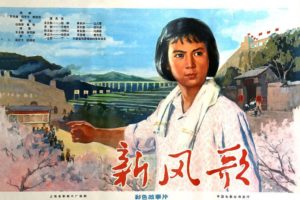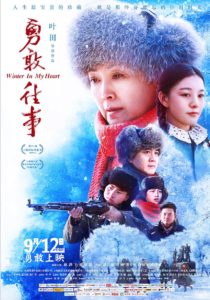Winter in My Heart
勇敢往事
China, 2018, colour, 2.35:1, 87 mins.
Director: Ye Tian 叶田.
Rating: 4/10.
Oldstyle inspirational drama, set across 40 years, lacks a strong script and involving drama.
Heihe city, Shenke county, Heilongjiang province, northeast China, the present day, winter. Yang Qingshan (Wang Yong) and a female companion revisit the site of an incident in a forest in which they were both involved 40 years earlier. Yang Qingshan suddenly collapses with a heart attack and an ambulance is called for. (Shanghai, c. 1976. At Hushen High School, the teenage Yang Qingshan [Pan Xingyuan] presents fellow student Fang Dan [Gong Fangni] with a copy of the book Brave 勇敢, which his father passed down to him, while her best friend Bai Ju [Tu Hua] looks on. Later, when Bai Ju, who comes from a “capitalist family”, is hasselled by Red Guards, she is defended by Yang Qingshan, who comes from a family with impeccable revolutionary credentials. Yang Qingshan, Fang Dan and Bai Ju, as well as fellow students Xu Pujiang [Fan Zewei] and Tong Husheng [Jiang Minfei], all decide to volunteer to go to the countryside as part of the Communist Youth League’s rural initiative, so they can remain together; Yang Qingshan chooses the frozen wastes of Heilongjiang, northeast China, in winter.) Yang Qingshan is in a stable condition in hospital but not yet out of danger. His businessman son Yang Xiaoyong (Liu Lei), from whom he’s been estranged for years, flies in from the US after hearing the news but his father won’t see him. Yang Xiaoyong is cool towards his father’s companion, accusing her of being the lover for whom Yang Qingshan threw up everything after his wife’s death to be with in Heilongjiang. She doesn’t comment, but gives Yang Xiaoyong the book Brave and asks him to read it “to understand your father”. (In the freezing winter the five volunteers arrive at Heihe village to work. Heihe is by the border with the Soviet Union, with whom China currently has bad relations. It becomes clear that Fang Dan and Yang Qingshan both like each other, whil Bai Ju just looks on silently. Tong Huasheng tries to denounce Xu Pujiang to Yang Qingshan after overhearing Xu Pujiang listening to Voice of America on a transistor radio, but Fang Dan destroys the letter he has written. The group is ordered to go and find people illegally crossing the border into the Soviet Union. In the forest they meet a local hunter [Naomene’erdeni] stalking a bear and, in the struggle to stop him shooting it, Fang Dan is accidentally shot dead by the hunter. Some time later, Yang Qingshan, Xu Pujiang and Tong Huasheng all prepare to sit the university entrance exam, apart from Bai Ju who decides to stay in Heihe by the grave of her best friend Fang Dan. Yang Qingshan begs her to come back to Shanghai with them, as the Cultural Revolution is over and her family background won’t count against her. She refuses, adding that both her parents are dead, so she has no family in Shanghai anyway. Yang Qingshan leaves her the copy of Brave.) Yang Xiaoyong finally realises that his father’s present companion is Bai Ju (Zhao Jing) and that his “lover” was the dead Fang Dan. (In Heihe, Bai Ju trains as a forest guard, and has a chance to arrest the hunter who shot her best friend.) Yang Xiaoyong tells Bai Ju he’s decided to stay in Shenke and not return to the US. (Years after the original events in Heihe a middle-aged Yang Qingshan visits Shenke briefly and finds Bai Ju trying to organise a farming co-operative, with difficulty. His wife has died and his son is about to go to the US to study. Back in Shanghai, Yang Qingshan sells his house and prepares to move to Shengke to join Bai Ju. His son is angry, thinking his father is going to join an old lover.)
REVIEW
The present and past are continuously intercut in Winter in My Heart 勇敢往事, an oldstyle “inspirational” drama in new clothes, with the theme of understanding the present from the past. As a tragedy in the modern day unlocks a story from 40 years earlier, a family misunderstanding is finally solved; the problem with the movie is that the drama is basically over once the misunderstanding is clarified halfway through, and there’s not enough material in the script by Shanghai Film Studio journeyman Li Yunliang 李云良, 70, to sustain the latter half. This third feature by Shanghai director Ye Tian 叶田 – following TV, online and documentary work, his interesting debut Shanghai Diary 上海日记 (2011) and flop comedy Dad, I Will Rescue You 爸爸我来救你了 (2016) – failed to inspire audiences, with box office of only RMB2 million.
The story begins with two ageing people revisiting the site of a tragic event they both witnessed in the mid-1970s. One is a former revolutionary cadre, Yang Qingshan; his female companion is unnamed. When the man suffers a heart attack in situ and his estranged son returns from the US to be with him, the events of the mid-1970s – in which a group of young Shanghai high-schoolers volunteered for labour in the snowy northeast, by  the border with the (then-hostile) Soviet Union – are gradually revealed, as is the identity of Yang Qingshan’s present-day female companion. Veteran actress Zhao Jing 赵静, 63, whose film career actually started with the youth-volunteer drama New Wind Song 新风歌 (1976, see poster, left), gives a convincing dignity to her modern-day character. But the best scenes are those in wintry Heilongjiang province as the Cultural Revolution comes to an end and a new political and economic era dawns. Among the cast, young newcomer Tu Hua 屠画 (who’d previously been in an online costume comedy directed by Ye) stands out for her underplaying of the teen version of Zhao’s character, who has a strong attraction and loyalty to her best friend (played okay by actress Gong Fangni 龚芳妮, who went on to co-star in the online cross-dressing youth musical Darling Boy 再见少女团, 2019). The men are less interesting, with actor-singer Pan Xingyuan 潘兴源, then in his late 20s, just okay as the teen cadre version of Yang Qingshan.
the border with the (then-hostile) Soviet Union – are gradually revealed, as is the identity of Yang Qingshan’s present-day female companion. Veteran actress Zhao Jing 赵静, 63, whose film career actually started with the youth-volunteer drama New Wind Song 新风歌 (1976, see poster, left), gives a convincing dignity to her modern-day character. But the best scenes are those in wintry Heilongjiang province as the Cultural Revolution comes to an end and a new political and economic era dawns. Among the cast, young newcomer Tu Hua 屠画 (who’d previously been in an online costume comedy directed by Ye) stands out for her underplaying of the teen version of Zhao’s character, who has a strong attraction and loyalty to her best friend (played okay by actress Gong Fangni 龚芳妮, who went on to co-star in the online cross-dressing youth musical Darling Boy 再见少女团, 2019). The men are less interesting, with actor-singer Pan Xingyuan 潘兴源, then in his late 20s, just okay as the teen cadre version of Yang Qingshan.
Production values are good without being glossy, led by the widescreen photography of snowy Heilongjiang in winter by Chao Chen 晁琛. The film, whose Chinese title means “Past Days of Bravery”, is dedicated to the 17 million educated-youth volunteers and the 40th anniversary of China’s reform and opening up.
CREDITS
Presented by Shanghai Film Group (CN), Shanghai Era Culture (CN), Shanghai Pinecone Pictures (CN).
Script: Li Yunliang. Script planning: Chen Ji. Photography: Chao Chen. Editing: Xu Dong. Music: Shi Jiayang. Title song music: Luo Wei. Lyrics: Pan Xingyuan, Zhao Dadi. Art direction: Sun Zixuan. Styling: Li Yun. Sound: Chen Bin. Visual effects: Peng Fei (Suzhou Xuanke Digital Technology). Executive direction: Wang Lei.
Cast: Zhao Jing (Bai Ju), Wang Yong (Yang Qingshan), Liu Lei (Yang Xiaoyong), Tu Hua (young Bai Ju), Pan Xingyuan (young Yang Qingshan), Gong Fangni (Fang Dan), Jiang Minfei (young Tong Husheng), Fan Zewei (young Xu Pujiang), Du Xiujun (Tong Husheng), Mao Jiming (Xu Pujiang), Naomene’erdeni (hunter), Wu Jiaming (Yang Tieliu), Aleksandra Martirosian (Kajal), Wang Lei (Red Guard leader), Wu Xuan (young village head), Wang Hongdong (forest-farm director).
Premiere: Shanghai Film Festival, 18 Jun 2018.
Release: China, 12 Sep 2018.
